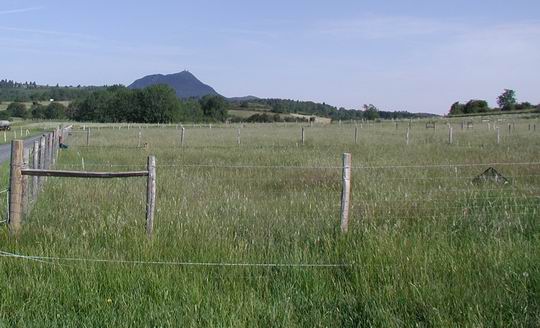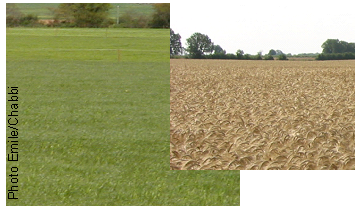ORE Environmental Research Observatory
ORE Environmental Research Observatory (ORE)
"Grasslands, Biochemical Cycles and Biodiversity" (PCBB)
...a long-term resource of observation of the grassland ecosystem...
DISCOVER will be supported by the ORE based at Inra of Clermont-Ferrand - Theix and of Lusignan (Centre of Poitou-Charentes) which aims at studying the influence of cultures and pastures on grasslands biodiversity (vegetation, microbes and fauna of the soil) and on the environment (waters and air quality, soil conditions).

To learn more (in French):
Environmental Research Observatory (ORE)
"Grasslands, Biochemical Cycles and Biodiversity" (PCBB), France.
This ORE aims at testing the long-term consequences of the place of temporary grasslands in culture rotations, on the one hand, and of the management mode of permanent grasslands, on the other hand. It includes two complementary sites, concerning:

Permanent grassland (Arrhenatherum type, Theix, Massif-Central, alt. 900 m asl). The experimental system is set up to 1) compare, in the absence of fertilization, three levels of pasture intensity by cattle and sheep to an abandoned control, and 2) compare two levels of fertilisation (P-K and N-P-K) in mowing to an unfertilised control. The experimental system includes 4 repetitions of each treatment in large stands (2200 m2 in pasturage).

Temporary grassland (Lusignan, Poitou, plain). Seeded mixtures of three pasture grasses (legume species added or not) will be included in a rotation of annual crops receiving contrasted levels of nitrogen fertilisation during three or six years. The experimental system includes one seeded-undisturbed (unploughed) control.
For each site and treatment, it is planned to study plants, insects, and soil microbes and fauna diversity through collaborations. Moreover, acquisition of data concerning primary productivity, atmosphere and hydrosphere fluxes, as well as vegetation and soil state is in progress within the ORE framework.